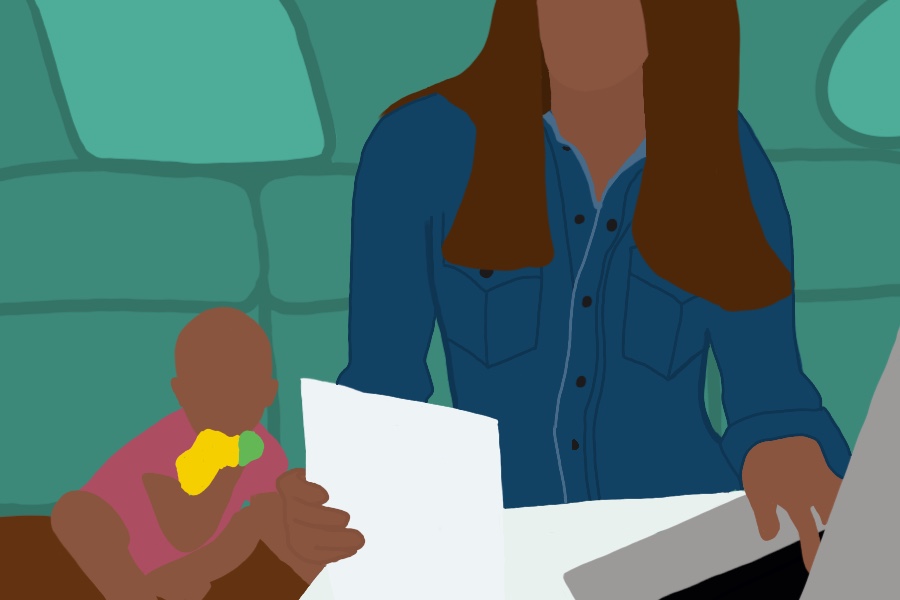Northwestern faculty and staff juggle parenting with remote learning during COVID-19 pandemic
Graphic by Catherine Buchaniec
Amidst the coronavirus pandemic, parents are working from home while simultaneously caring for their children. Many parents don’t know when child care will resume.
May 7, 2020
For Northwestern staff and faculty with young children, shelter-in-place is the opposite of a reprieve as the transition to remote duties breaks down boundaries between work and home.
Elizabeth Lukehart, associate director of the Farley Center for Entrepreneurship and Innovation, has a baby and a toddler. When her childrens’ day care shut down in March, it brought her a cycle of 24-hour days and relentless responsibility, she told The Daily.
From 5:30 a.m., when her 10-month old wakes up, to 7:30 p.m., when her children go to sleep, Lukehart and her husband juggle parenting with their remote teaching jobs. After her kids are in bed, Lukehart said she has to stay up and keep working to complete her daily teaching and administrative duties.
“A lot of people are talking about all the free time they suddenly have now,” Lukehart said. “But for people with kids, and I think especially with young kids, we have never been so busy in our entire lives.”
Lukehart’s colleague at the Farley Center, associate director of operations and program manager Donna Wang Su, said balancing the demands of her job with the virtual schooling schedules of her 5th and 2nd graders has required new levels of organization.
To keep her family on track, Su said, she put up peelable whiteboards all over her house, with personalized to-do lists and color-coded schedules. Su said one of her biggest concerns is what she will do if Northwestern’s campus opens up before her children — who are both Evanston/Skokie School District 65 students — go back to school.
“I think one of the top things as (administrators) start talking about a return to campus and the staggered approach is I keep thinking, what am I going to do with my children if their summer camps are canceled, their school is still going to be online,” Su said. “What is that going to look like, not just for me, but for all the other parents out there?”
She added that the pandemic has also brought emotional challenges, and that isolation has been difficult for her kids.
Richard Carroll, director of the Faculty Wellness Program, said some faculty have reached out about the emotional tolls and stresses of the pandemic, but added that he was surprised by how many parents have told him that despite the stress of remote schooling, they have found increased satisfaction with their family lives since the pandemic.
“What I’m seeing is that one of the effects of this crisis is that it’s shaking up people’s usual ways of doing things,” Carroll, who is also an associate professor of psychiatry and behavioral sciences, said.
Andrew Rivers, associate professor of instruction in physics and astronomy, said he has enjoyed finding ways to involve his children, who are 11, 8 and 6 years old, in his own teaching curriculum.
Rivers’ kids helped him build a wave model out of candy and kebab sticks, presenting it to his undergraduate students over Zoom. For another class, he said he measured the width of his daughter’s hair with a laser pointer to teach a lesson about diffraction patterns.
“Being able to exercise my creativity a little bit, that’s been one of the best parts of this whole quarantine experience,” Rivers said.
Still, Rivers said he and his wife have been privileged in their experience with the pandemic, adding that the dissolving barrier between work and home life has brought challenges for many of his colleagues.
The University currently offers resources that provide small reimbursements for eligible faculty, staff, and students who are using at home care providers or other centers for children or elderly family members, and increased reimbursements for employees required to come to campus.
Lukehart said she has also received invitations to virtual support groups and wellness events, but hasn’t had time to participate. She added that although she has experienced a lot of empathy, particularly from students, Northwestern’s culture of hyperproductivity has not disappeared with the transition to remote work.
“I would love to see a more explicit acknowledgment that we can’t continue business as usual,” Lukehart said. “We all work really hard and that’s great, but also now is the time where we all need to give ourselves and each other some grace, and understand that a lot of us are sort of underwater with all the things we have going on at home.”
Email: [email protected]
Twitter: @keerti_gopal
Related Stories:
— “The show must go on”: Evanston’s new and expecting mothers confront anxiety, isolation


